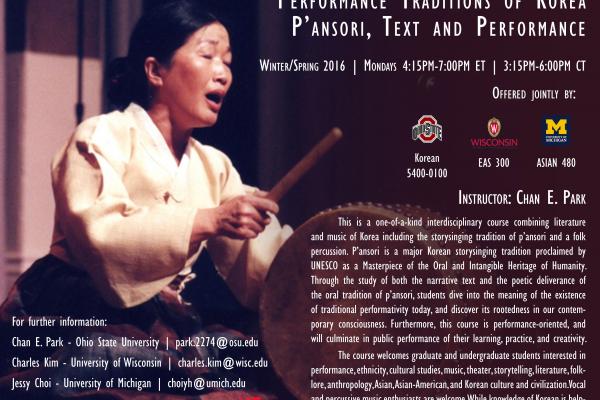Courses on Korean performance traditions, politics and history to be offered in Spring 2016 as part of Korean eSchool

Korean 5400: "Performance Traditions of Korea: P'ansori, Text and Performance"
Mondays, 4:15 - 7:00 p.m., 186 Hagerty Hall
Taught by Prof. Chan Park at The Ohio State University and shared via videoconference technology with the University of Michigan and the University of Wisconsin
This is a one-of-a-kind interdisciplinary course combining literature and music of Korea including the storysinging tradition of p'ansori and a folk percussion. P'ansori is a major Korean storysinging tradition proclaimed by UNESCO as a Masterpiece of the Oral and Intangible Heritage of Humanity. Through the study of both the narrative text and the poetic deliverance of the oral tradition of p'ansori, students dive into the meaning of the existence of traditional performativity today, and discover its rootedness in our contemporary consciousness. Furthermore, this course is performance-oriented, and will culminate in public performance of their learning, practice, and creativity.
International Studies 5050: "Two Koreas: Political Economy of Regional Rivalry"
Tuesdays/Thursdays, 2:20 - 3:40 p.m., 186 Hagerty Hall
Taught by Dr. Young-Bae Hwang at The Ohio State University and shared via videoconference technology with Indiana University and the University of Maryland
History 3436: "History of Modern Korea"
Mondays/Wednesdays, 3:30 - 4:45 p.m., 245 Enarson Hall
Taught by Prof. Charles Kim at the University of Wisconsin and shared via videoconference technology with The Ohio State University and Pennsylvania State University
Ever since the establishment of two Korean nation-states after the end of World War II, North Korea and South Korea have been part and parcel of key trends and phenomena in East Asia and the world. As such, the post-1945 history of Korea has been shot through with transformations, dynamism, conflicts, triumphs, and, most of all, the unexpected. This course explores the politics, society, and culture of the two Koreas. Key topics include national division and the Korean War, the Cold War, memory, protest, popular culture, and globalization.
Students may register for the courses via Buckeyelink. Contact Prof. Mitch Lerner, director of the Institute for Korean Studies, at lerner.26@osu.edu with any questions.
